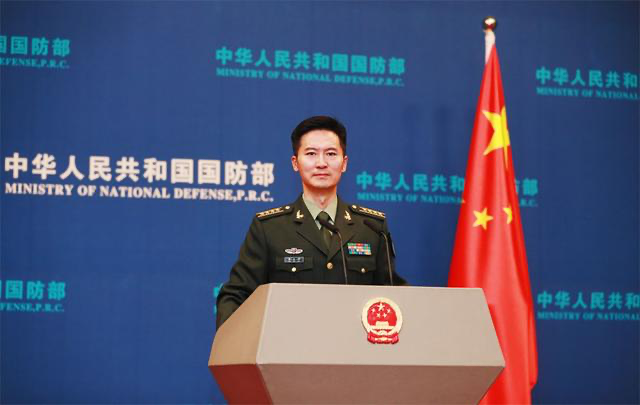Published: August 01,2023

Senior Colonel Tan Kefei, spokesman for the Ministry of National Defense. [Photo/mod.gov.cn]
The Ministry of National Defense expressed strong opposition on Saturday to Japan’s 2023 Defense White Paper, which labeled China as Japan’s “unprecedented greatest strategic challenge”.
The white paper claimed that China has significantly increased defense spending, accelerated military development, unilaterally altered the status quo in the East China Sea and South China Sea, conducted joint operations with Russia near Japanese air and maritime areas, and posed a threat to peace and stability in the Taiwan Strait.
The Japanese defense white paper clings to the country’s mistaken perception of China, deliberately exaggerates the so-called “Chinese military threat,” smears China’s legitimate military development and activities, rudely interferes in China’s internal affairs and provokes regional tensions, said Tan Kefei, spokesman for the ministry.
“We strongly oppose this and have already made serious representations to Japan,” the spokesman noted.
Tan reiterated that China’s military has always been a staunch force in maintaining world peace and stability, never challenging or threatening anyone. Conversely, in recent years, Japan has steadily departed from the constraints of its ‘peace constitution’ by substantially increasing defense spending and advocating for the development of so-called “counterstrike capabilities”, he said, adding that it has aligned itself with certain major powers, forming targeted “small circles”.
These acts have posed a severe challenge to regional and global peace, security, and stability, he added.
The spokesman emphasized that China firmly upholds the international maritime legal order and has a consistent and clear stance on maritime issues. Currently, the situations in the East China Sea and South China Sea remain generally stable.
However, certain countries, driven by their own interests, frequently dispatch warships and aircraft to the relevant maritime areas as a display of military power, gravely exacerbating regional tensions.
China-Russia defense cooperation is based on the principles of non-alignment, non-confrontation and non-targeting of any third party. Their commitment is to maintain regional and global peace and stability without posing a threat to any country.
“Taiwan is a part of China. The One-China principle is the political foundation of China-Japan relations, a bottom line which cannot be crossed,” said Tan, highlighting Japan’s grave historical responsibility for the Taiwan issue.
In recent years, instead of reflecting upon itself, Japan has continuously interfered in China’s internal affairs, violated the basic norms of international relations, contradicted the spirit of the four political documents between China and Japan and undermined the political foundation of China-Japan relations, exacerbating tension in the Taiwan Strait region. This is highly erroneous and dangerous, he said.
The spokesman urged Japan to learn from historical lessons, refrain from irresponsible words and actions, abandon zero-sum and confrontational thinking toward neighboring countries, develop a correct understanding of China and take practical steps to restore bilateral relations onto the right path.
China Daily
 Africa -China Review Africa -China Cooperation and Transformation
Africa -China Review Africa -China Cooperation and Transformation
